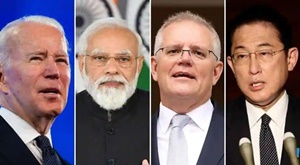India is all set to join the US-led Indo-Pacific Economic Forum (IPEF) — a mega “economic arrangement” that will counter China’s rising economic clout. US President Joe Biden will launch the IPEF at the Quad Summit next week in Tokyo.

US President Biden will be extending a formal invitation to Prime Minister Narendra Modi to join the IPEF when the leaders of the Quad – US, Japan, Australia and India - meet for the summit in Tokyo next week.
Besides the US, Japan, Australia and India, the IPEF will also have South Korea, New Zealand, Malaysia, Singapore, Indonesia, Thailand, Vietnam, and the Philippines as members. More members could be added later, reports citing sources said.
Reports said India and the US have reached an understanding on the IPEF during finance minister Nirmala Sitharaman’s visit to the US last month. It was agreed then that although the IPEF will demand “high standards” by way of establishing and maintaining trade facilitation, supply-chain resilience, and infrastructure, it will nevertheless be a “strategic move” targeting China.
India, which already has bilateral agreements with Australia and Japan, was initially reluctant to join the IPEF, as it is keener on having a bilateral trade pact with the US.
India is reported to have been pushing for a larger free trade agreement (FTA) within the Quad as that would mean dealing with a small number of countries, and would also enable it to enhance its trading standards.
However, sources said, New Delhi now believes that although the IPEF is not an FTA per se, it will nevertheless help India face up to the China challenge, as Beijing tries to dominate all the supply-chain linkages in Asia under the Regional Comprehensive Economic Partnership (RCEP), which came into effect on 1 January 2022.
“This is an initiative of the United States. We have received details of this. And we are examining it,” Arindam Bagchi, spokesperson of the ministry of external affairs, said on Thursday about the IPEF.
Japan, South Korea, New Zealand, Australia, and the 10 ASEAN member states are already member of the China-led Regional Comprehensive Economic Partnership (RECP), which aims to remove tariffs on about 90 per cent of the goods traded among member countries over a span of 20 years.
Since coming into effect, it has already accrued tremendous benefits for China.
China’s trade with the other 14 member states expanded 6.9 per cent year-on-year to 2.86 trillion yuan (about $448.6 billion) in the first quarter of 2022, accounting for 30.4 per cent of China’s total foreign trade value, according to the General Administration of Customs (GAC).
India walked out of the RCEP in November 2019 owing to the China challenge.
Addressing a press conference on Wednesday, US National Security Adviser (NSA) Jake Sullivan confirmed that, during his trip to Tokyo next week, President Biden will launch the IPEF, which he described as “a new, ambitious economic initiative for the region”.
Sullivan said the IPEF is a “21st-century economic arrangement, a new model designed to tackle new economic challenges — from setting the rules of the digital economy, to ensuring secure and resilient supply chains, to managing the energy transition, to investing in clean, modern, high-standards infrastructure”.
He also added that the Indo-Pacific Economic Framework would send a powerful message to China.
“We think that message will be heard everywhere. We think it will be heard in Beijing,” he said.
Prabir De, a professor at the Research and Information System for Developing Countries (RIS) and coordinator of the ASEAN-India Centre (AIC) at the RIS, said “India should not miss the IPEF moment”.
“The IPEF will fill up the gap in RCEP or CP-TPP (Comprehensive and Progressive Agreement for Trans-Pacific Partnership) — both purely trade liberalisation initiatives where India and the US were absent,” he added.
“The IPEF may garner interest if it is turned into a real economic programme instead of merely advancing the US security objectives,” he said.
The focus of the IPEF, De added, “is on seven aspects, and some of them are important for India such as trade facilitation, particularly for SMEs (small & medium enterprises), standards for a digital economy and technology, supply-chain resilience, and clean energy infrastructure”.
According to a report by the Washington-based Center for Strategic and International Studies (CSIS), the Biden administration has “portrayed the IPEF to domestic stakeholders as an initiative that will allow the United States to better compete with China in the region”.
“As a result, some regional partners expressed concern that the IPEF is primarily a political endeavour meant to counter China, rather than a sincere and thoughtful economic policy integration initiative,” the report said.
“This perception of an anti-China bent has a chilling effect on enthusiasm among certain prospective South and Southeast Asian participants who are aiming to deepen economic relationships with both the United States and China,” it added.




















